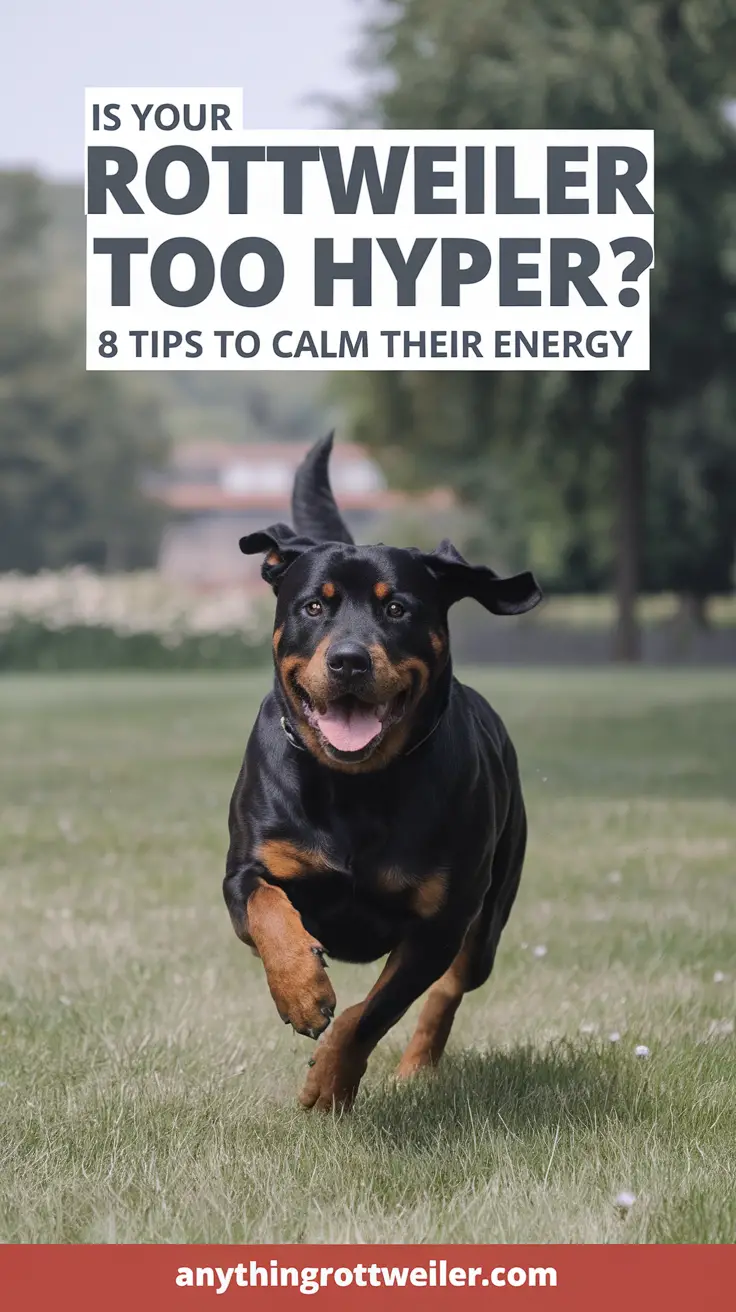Picking the right dog is super important, and most folks don’t intentionally go for a hyper one. Dealing with a superactive dog can be challenging; sadly, many are given away. It’s a real bummer for both the owner and the pup.
Imagine getting a hyper Rottweiler and not knowing what to do! Are Rottweilers naturally crazy energetic and hard to handle, or is it just because some people want a guard dog but aren’t great at training?
Rottweilers have lots of energy, which is normal for a working dog. But there’s a difference between that and them being too hyper. It’s essential to know this before picking a Rottweiler or any working dog.
This article breaks down why Rottweilers might be hyper and shares tips from experts on how to deal with it. Stay tuned to make intelligent choices when getting a Rottweiler or working dog.
Are Rottweilers So Hyper? The Truth About Hyper Behavior
Understanding hyperbehavior in Rottweilers means recognizing abnormal levels of constant activity. Rottweilers may growl or bark due to excitement, not aggression. While not inherently aggressive, they are naturally protective as a guarding breed.
Hyperactivity in Rottweilers may stem from boredom, often caused by insufficient exercise, training, and attention. Professional training isn’t mandatory, but regular exercise and mental stimulation are crucial to prevent boredom-induced hyperbehavior.

Hyperactive Vs. Active Rottweiler Puppy
One of the most common phases of life where Rottweilers (and all dogs) can be unfairly labeled as hyper is puppyhood. Puppies are naturally exuberant, energetic, and active. But this behavior is normal and is very different from hyperactive behavior.
Puppies may jump for the joy of jumping, play-bite because they are teething and in pain, bark to hear their voices, rip apart couch cushions out of boredom (or teething pain), and get into everything because everything is new and exciting.
Initially, most Rottweiler puppy owners find these behaviors cute. But as their Rottweiler grows bigger and stronger, cute behaviors turn into dangerous behaviors.
Once a behavior becomes a problem, enjoying life with your dog becomes harder. Some Rottie owners even start to feel unsafe around their dogs simply because they haven’t received the proper training early enough.
Luckily, positive dog training solves these problems – and make no mistake about it, they are problems. A hyper dog can quickly become an out-of-control dog, as this YouTube dog training video highlights.
In the video, the dog trainer shares that the Rottweiler’s owners were worried their dog would get taken away or put down because the dog was so hyper. But after training, the problem behaviors subsided, and things settled down.
As the American Kennel Club (AKC) explains, the Rottweiler needs early and ongoing training and socialization with strange people and strange animals to learn to manage themselves well in a family and community.
Many training methods can effectively eliminate hyperactivity in a Rottweiler dog. Because ignoring the behavior can lead to many dangers, never hesitate to contact a dog training expert for help.
Why Would an Adult Rottweiler Dog Be So Hyper?
As a large to a giant dog breed, the Rottweiler dog takes a long time to grow into adulthood.
If you are learning about the Rottweiler dog breed for the first time, you may not yet realize that those adorable fluffy little puppies can quickly grow up to weigh 135+ pounds and stand up to 27 inches tall!
Even though Rottweilers, like so many large and giant dog breeds, have a shorter life expectancy of just nine to 10 years, they can take up to three years to completely outgrow their puppyhood life phase.
What does this mean for you, the Rottweiler owner? It means you may see puppyhood behaviors well into your dog’s second or third year of life!
It is easy to look at a Rottweiler dog that seems fully grown and looks like an adult dog and not understand why some behavior still seems so puppy-like and hyper.
But once you understand that Rotties stay puppies for longer, you can more easily understand an extended period of energetic behavior and make plans to train accordingly.
Also, when an adult Rottweiler exhibits behavior that is not characteristic of (aka normal for) this dog breed, it is essential to dig deeper and look for another reason that may be causing your dog to act this way.
What Might Cause An Adult Rottweiler to Become Hyperactive?
VetStreet gives a good overview of the typical or normal adult Rottweiler dog personality.
Rottweilers grow up with a moderate daily energy level and moderate activity needs. They also have naturally low barking tendencies and only bark when they think you need to know about something or a threat has been identified.
So, with this breed profile, you wouldn’t necessarily expect an adult Rottweiler to exhibit hyper behavior.
What might cause an adult Rottie to become hyperactive or not outgrow the high energy levels of puppyhood? Let’s take a closer look at this important question.
1. Your Rottweiler is lonely
The number one thing to know about the Rottweiler breed is that they are intensely bonded to “their” people. These dogs must be a considerable part of your and your family’s lives.
If a Rottweiler dog is often left alone or banished to the outside areas of a home, it will be very lonely. A lonely Rottweiler will be so glad to see its people that hyperactivity is one potential result.
2. Your Rottweiler is bored
The Rottweiler is brilliant. These dogs score in the highest tier of canine intelligence, measured by a canine psychologist and nearly 200 canine trainers.
So, if a Rottweiler dog is not given sufficient mental and physical activity, stimulation, and interest in their day, this will likely result in hyperactivity.
A bored Rottweiler will turn into a destructive Rottweiler in short order because boredom will drive your dog to find something interesting, even digging up your yard or remodeling your den.
3. Your Rottweiler isn’t getting enough exercise
While Rottweilers in adulthood don’t need to go nonstop to stay healthy like some working dog breeds, they need one to two hours of daily activity to burn off steam.
The best way to achieve this is to enroll your dog in some canine athletics or schedule at least two to three periods of walks, jogs, play sessions, and daily activities. This will ensure that instead of a hyperactive Rottweiler, you have an exhausted Rottweiler who is happy to doze off on the couch with you at night.
4. Your Rottweiler is sick or injured
Dogs can’t tell their people in words when they are suffering. They have to show you with their behavior. As Dogs Naturally Magazine points out, a dog is often mislabeled as hyperactive when that dog doesn’t feel good.
Here are some of the most common reasons why health might provoke hyperactivity in a Rottweiler of any age:
- Thyroid disease.
- Vaccination side effects.
- Medication side effects.
- Feeding the wrong food (food allergy).
- Coming in contact with a toxin or poison.
- Skin allergies or infections.
5. Your Rottweiler is afraid
Finally, if your Rottie seems to have random periods of hyperactivity followed by periods of calm behavior, it may be that your dog is afraid.
Loud noises, strange people or animals, odd odors, weather events, and other incidents may be causing periods of hyperactivity in your dog that are directly linked to something fearful in its environment.
Because Rottweilers are so people-oriented, they can develop separation anxiety that may manifest as hyperactivity.
A sudden move to a new home, the addition of a family member (human or animal), a separation from a family member (such as divorce or a child leaving for college), or the loss of another pet with whom your dog was bonded can all cause intense fear.
Being relinquished and re-homed is a common source of fear in Rottweilers, which can lead to hyperactivity and/or separation anxiety. Because these dogs can be difficult to socialize, some owners find them “too much dog” for their lifestyle.
Now you understand how Rottweilers have gotten the reputation of being more hyperactive dogs. With the right socialization, training, and lots of love, you can help your Rottie live happily and calmly with you and your family.

